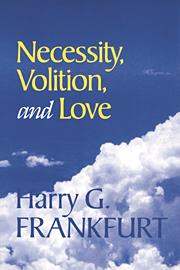Book contents
- Frontmatter
- Contents
- Preface
- Sources
- 1 The Logic of Omnipotence
- 2 Descartes's Discussion of His Existence in the Second Meditation
- 3 Descartes on the Creation of the Eternal Truths
- 4 Two Motivations for Rationalism: Descartes and Spinoza
- 5 Continuous Creation, Ontological Inertia, and the Discontinuity of Time
- 6 Concerning the Freedom and Limits of the Will
- 7 On the Usefulness of Final Ends
- 8 The Faintest Passion
- 9 On the Necessity of Ideals
- 10 On God's Creation
- 11 Autonomy, Necessity, and Love
- 12 An Alleged Asymmetry between Actions and Omissions
- 13 Equality and Respect
- 14 On Caring
5 - Continuous Creation, Ontological Inertia, and the Discontinuity of Time
Published online by Cambridge University Press: 15 December 2009
- Frontmatter
- Contents
- Preface
- Sources
- 1 The Logic of Omnipotence
- 2 Descartes's Discussion of His Existence in the Second Meditation
- 3 Descartes on the Creation of the Eternal Truths
- 4 Two Motivations for Rationalism: Descartes and Spinoza
- 5 Continuous Creation, Ontological Inertia, and the Discontinuity of Time
- 6 Concerning the Freedom and Limits of the Will
- 7 On the Usefulness of Final Ends
- 8 The Faintest Passion
- 9 On the Necessity of Ideals
- 10 On God's Creation
- 11 Autonomy, Necessity, and Love
- 12 An Alleged Asymmetry between Actions and Omissions
- 13 Equality and Respect
- 14 On Caring
Summary
Descartes's doctrine that natural things cannot endure unless divine creation is continuous appears in each of his three major philosophical works. There are two brief allusions to it in the Discourse on Method. It plays a larger role in the Third Meditation, where it is developed as a step in Descartes's second argument for the existence of God. Evidently the doctrine did not become less significant in Descartes's thought as time went on. He presents it in the Principles of Philosophy (I, 21) as sufficient in itself to serve as a proof that God exists.
In Part IV of the Discourse (AT VI, 36), Descartes observes that if there are any finite minds or bodies in the world, “leur être devait dépendre de sa puissance, en telle sorte qu'elles ne pouvaient subsister sans lui un seul moment.” This suggests that created things, besides owing to God their creation, owe to Him at each moment the continuation of their existence as well. They could no more endure without God than they could begin to exist without Him. Descartes does not make very explicit what he has in mind here. He leaves it unclear both why God's power is essential to the subsistence of things and how God's power accounts for their subsistence. The doctrine is introduced without argument and without explanation.
Later in the Discourse, during a discussion of how the world reached its present condition, Descartes says this:
… il est … vraisemblable que, dès le commencement, Dieu l'a rendu tel qu'il devait être.
- Type
- Chapter
- Information
- Necessity, Volition, and Love , pp. 55 - 70Publisher: Cambridge University PressPrint publication year: 1998
- 2
- Cited by

